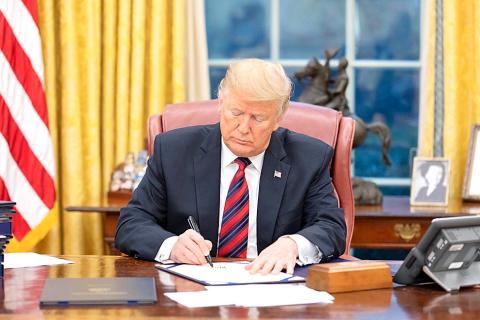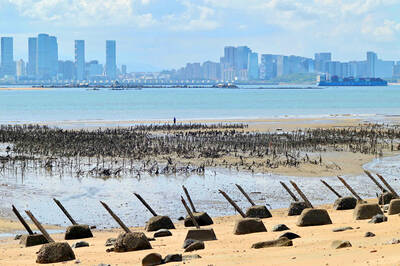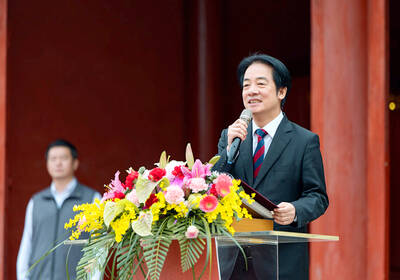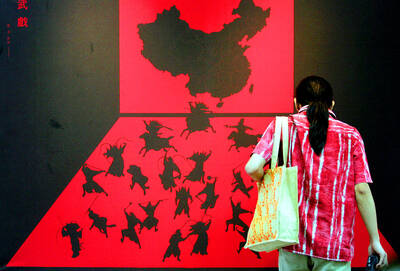The Ministry of Foreign Affairs yesterday thanked the US for its support for Taiwan, after US President Donald Trump signed legislation aimed at enhancing the US’ influence in the Indo-Pacific region and reaffirming Washington’s commitment to Taiwan, particularly arms sales.
The timing of the signing was especially significant, as this year marks the 40th anniversary of the enactment of the Taiwan Relations Act, the ministry said, adding that Taiwan looks forward to deepening its ties with the US, as well as cooperation with like-minded nations in the region to promote peace, prosperity and stability.
Trump on Monday signed into law the Asia Reassurance Initiative Act and 12 other bills, the White House announced, although the US president seemed eager to make clear he would not be constrained by the bill’s demands that the US be more engaged in the region.

Photo: CNA / Photo provided by the White House
“Several provisions of the act ... purport to dictate the policy of the United States in external military and foreign affairs, or to require the executive branch to undertake certain diplomatic initiatives with international partners,” Trump said in a statement. “My administration will treat these provisions consistent with the president’s exclusive constitutional authorities as commander in chief and as the sole representative of the United States in foreign affairs.”
The bill was introduced in April by US senators Cory Gardner, Ed Markey, Marco Rubio and Ben Cardin.
It serves as a policy framework to enhance US leadership in the Indo-Pacific region and to demonstrate a commitment to a free and open Indo-Pacific and rules-based international order, Gardner said.
Section 209 of the bill states that it is the policy of the US to support the close economic, political and security relationship with Taiwan.
It is US policy “to faithfully enforce” all existing US government commitments to Taiwan, consistent with the Taiwan Relations Act, the three US-China joint communiques and the “six assurances” agreed to by former US president Ronald Reagan, the bill says.
It further reiterates US policy as countering efforts to change the “status quo” and supporting “peaceful resolution acceptable to both sides of the Taiwan Strait.”
On arms sales to Taiwan, the act says that the US president should conduct regular transfers of defense articles to Taiwan that are tailored to meet the existing and likely future threats from the People’s Republic of China.
That should include “supporting the efforts of Taiwan to develop and integrate asymmetric capabilities, as appropriate, including mobile and cost-effective capabilities, into its military forces,” the bill says.
It also urges the US president to encourage the travel of high-level US officials to Taiwan, in accordance with the Taiwan Travel Act.
Additional reporting by Lu Yi-hsuan

THREATS: Naval facilities have been built in Shanghai and Zhejiang, while airbases have been expanded in Xiamen, Fuzhou and Zhangpu, across the Strait from Taiwan The Chinese Communist Party (CCP) is building large-scale military infrastructure at five sites along the eastern coast of China, the Mainland Affairs Council (MAC) said in a recent report. The latest issue of the council’s Mainland China Situation Quarterly said satellite photos showed military infrastructure such as air force and naval bases being constructed along the eastern coast of China. That means the CCP might be preparing for potential conflict in Taiwan, it said, adding that there are five such construction sites from north to south. A naval base has been built in Shanghai’s Pudong New Area, with underground oil storage tanks, railway

GIVE BACK: The president thanked immigrants, recounting heartwarming stories, from a gymnast helping athletes shine internationally to a spouse helping the disadvantaged There is no need to amend the law to exempt Chinese spouses from single allegiance to the Republic of China (ROC), President William Lai (賴清德) said yesterday, adding that such changes would only increase the public’s doubts toward new residents from China and would not improve social harmony. Taiwan is a democratic, diverse and free country, he said. “No matter which ethnic group you belong to, where you come from or when you arrive, as long as you identify with Taiwan, you are masters of this country,” he said. Taiwan is a democratic nation that follows the rule of law, where immigrants are

‘BEST RESULT’: Deputy Minister of Foreign Affairs Francois Wu said that Donald Trump’s silence on the issue signaled that Taiwan was not being treated as a bargaining chip “Reunification” with China is “not an option” for Taiwan, Premier Cho Jung-tai (卓榮泰) said yesterday, after Chinese state media reported that the issue was brought up in a telephone call between Chinese President Xi Jinping (習近平) and US President Donald Trump. “We have noted this significant international exchange, but we must reiterate that the Republic of China (Taiwan) is a fully sovereign and independent country,” Cho said at the legislature when reporters asked him about the issue. “The 23 million people of Taiwan do not have a ‘reunification’ option. This is very clear. Taiwan is the world’s Taiwan,” Cho said. Trump and Xi

A trial run of the north concourse of Taiwan Taoyuan International Airport’s new Terminal 3 is to commence today, the Ministry of Transportation and Communications said yesterday. The eight additional boarding gates would allow for more aircraft parking spaces that are expected to boost the airport’s capacity by 5.8 million passengers annually, Deputy Minister of Transportation and Communications Lin Kuo-shian (林國顯) said. The concourse, designed by a team led by British architect Richard Rogers, provides a refreshing space, Lin said, adding that travelers would enjoy the tall and transparent design that allows sunshine to stream into the concourse through glass curtain walls. The